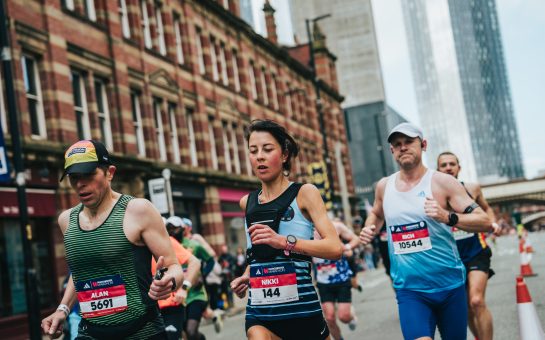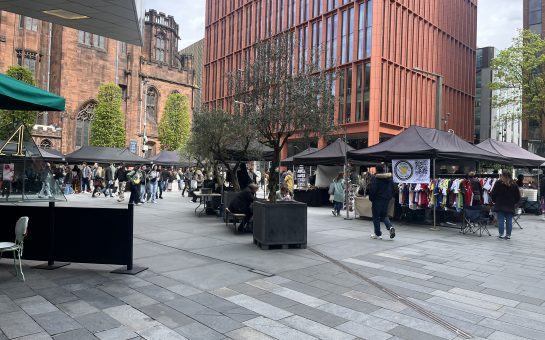If you want to blame a city for communism, blame Manchester.
Documenting the city’s crowded slums in the 19th Century led Marx and Engels the foundation of communist theory, altering politics forever.
So it is fitting that more than a century later, Greater Manchester’s first mayoral election has a communist candidate.
MM went along to the Communist League offices in central Manchester to talk to Peter Clifford, their candidate for the May 2017 election.
The League’s offices are in a utilitarian 60’s office block. Once dashingly modern, the block now stands awkwardly amongst gentrified Victorian warehouses and trendy coffee shops.
Inside the office, rows of books charting and analysing the communist struggle adorn the walls. There is nothing superfluous to detract from the mission to end capitalist rule.
Peter, 61, is neatly dressed and clean-shaven, a far cry from the citizen-smith stereotype.
He is mild mannered but quickly becomes impassioned when he talks about the challenges that face working people today.
“2016. Were in uncharted territory,” says Peter. “Working people are getting more uncertain and concerned about what’s happening to them.
“Real wages have fallen 10% on average in the last 10 years in this country, second to Greece. Many people are concerned. And we have wars that don’t seem to end. At least since 2003 we’ve had continuous war. That is a long time.” Peter adds despairingly.
The Communist League’s goal in this election is not to win power but to spread the message that there is an alternative to our current system.
Manchester’s Mayoral election is no more a part of a grand strategy than it is another opportunity for the Communist League to take a stand for working people.
For Peter, the election is just one more front in a global struggle against international capitalism with battles ranging from protests to vote canvassing.
The Communist League will measure their success in this election not by votes, but by the resulting attention they receive and people they can win to their cause.
For them, no election victory within a capitalist system will change things because it is capitalism that is the problem.
“This election will change nothing,” warns Peter. “The Greater Manchester Mayor will be triumphed as though the people of Manchester are going to have some say over their livelihoods.
“Well our opinion is that nothing of qualitative significance will change whatsoever because there is no way that any politician that does not break from capitalism will change anything.”
Later Peter says that no matter who becomes mayor, “we [the working class] will have no more control over the city we live in than we have control over country we live in“.
The Communist League’s outlook is far bigger than Manchester. Peter explains that “workers here are going through the same thing as workers in Bonne and Paris and Baghdad are going through. There is no just-Manchester solution.”
No one would doubt Peter’s claim that UK politics is in “uncharted territory”. The rise of Corbyn and Brexit are signs of a deep popular unrest that Peter is all too aware of.
“Five or six years ago our campaigning as the Communist League would be focused around particular issues,” reveals Peter, “But what we find now is that we can go on a doorstep anywhere in Greater Manchester amongst working people and just lay out that the root of all these different problems is capitalism and that it is the working class that is the answer.
“We get a hearing to that in a way that we haven’t been getting before.”
Peter believes that the government is aware of this simmering discontent as well. “She [Theresa May] basically cautioned her party by saying there was a quiet revolution happening” Says Peter, referencing her comments in the Conservative Party Conference last month.
“[May] is saying that if we don’t address the working class it will be a bit more than a quiet revolution, which is also what we believe.”
A major part of this discontent is a wide spread distrust of mainstream politicians. An Ipsos-Mori poll taken at the start of this year found that just 21% of Britons trusted politicians to tell the truth.
Peter’s background is certainly not rooted in communism. Growing up in an army family during the Cold War his family moved around a lot, living in Germany and Hong Kong amongst other places.
As a teenager he started to take notice of the world around him, particularly the civil rights movement and the troubles in Northern Ireland.
The turning point that started Peter on the path to communism came on Bloody Sunday in 1972.
Peter was horrified to see the army that he had been brought up to believe in shoot dead 13 unarmed protesters in Derry.
“That was a big thing for me,” said Peter. “I thought there’s nothing progressive about this. This is outrageous”
From there Peter joined political actions that opposed British troops in Ireland, the US war in Vietnam and the miners’ and dockers’ strikes of the 1970’s.
Finally, in 1988, the Communist League emerged from these struggles with Peter as a founding member.
Peter concedes that the world of the 70’s is not the same as the 00’s but emphatically believes that the struggles are the same: that the ruling capitalist class is exploiting the working class and condemning them to servitude in the pursuit of profit.
Peter is particularly troubled by the rise of workers classed as self-employed by employers such as Hermes. He feels that classifying workers in this way means employment figures can be boosted without offering stable employment while leaving workers with fewer employment rights.
For the Communist League, grievances like these are more fuel for their campaign to end capitalism one struggle at a time. Their only promise to voters in 2017 is that they will be there for every struggle that progresses the working class.
This election is an opportunity for the Communist League to gain exposure for their message and, in the post-crash, post -Brexit, world of rampant public distrust and “quiet revolutions” their message is getting more attention.
There may not be a communist mayor for Manchester in 2017 but beyond the campaigning of the mainstream parties, the seeds of potential revolutions are being sown in the rich compost of discontent.



